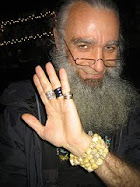Saturday, July 12, 2008
Loving the Abyss
"He who fights monsters should look to it that he himself does not become a monster. And when you gaze long into an abyss the abyss also gazes into you." 'Beyond Good and Evil' by Friedrich Nietzsche
CHILDREN PLAYING IN THE SAND.
Fellow spiritual Traveler
I miss spending time with you. Your POV of reality is always refreshing and in some ways grounding. Don't worry that you rant. This is normal for someone who is seeing more than the average person who is not immersed in the "they"* world.
The problem is possession, the state when we are being hypnotized by someone or something. This some THING, THIS SEIEND* can be so called “real”, unreal, paranoiac, fantasy ‘the truth’ etc. but they are all just Matrixes that limit us if we can not step out of them. Chess is a Matrix of Possibilities. I spent periods of my life where nothing else existed. It helped me deal with the “they” world by giving me a refuge to heal. Eventually I had to step out of the Chess Matrix and deal with the “they” Matrix. To say that the Chess Matrix is less real than the ‘they’ Matrix is missing the point. I can play chess whenever I want and I can play the ‘they’ Matrix when NEEDED. It is the skill through spiritual discipline to play in whatever sandbox that allows you to unfold to your true spiritual destiny. Carl Jung found himself buying and being obsessed with Alchemy Books. He asked: 'Where these just medieval rants that purported to find mystical recipes that could change lead into gold or change gross matter into the elixir of life?' The Alchemy Matrix had possessed Jung. When he was given the key to Alchemy by Richard Wilhelm in the book ‘THE SECRET OF THE GOLDEN FLOWER’ the obsession only increased but the possession decreased. He was becoming more aware, more conscious and this put him on a higher level of consciousness that allowed him to exorcise the possession with his new found genius. To say possession is always wrong of course depends if it is part of your spiritual unfolding or enslavement. Jung kept himself sane through his spiritual discipline of Depth Psychology and in troth with the process of awakening. Jung called this the individuation process and some like Abraham Maslow have called it Self-Actualizing. The alchemist could of called it working on their Magnum Opus. The Hindu’s call it Yoga, the Chinese call it the Tao, New Agers call it Enlightenment. People who hold Troth with AbenLand call it God, Gott, Goth, Gote, Xot, etc. (X=G in Xot Language) In this Xoting, this quickening, we come to know we are more than any one matrix or combination of matrixes we are the ground of these matrixes that surpassed all restrictions of time and space. Unfortunately Judeo-Christianity has high jacked these sacred words and bastardized them to such extend we are hostile and alien to them.
Each matrix is a sand box and we are children destined for endless play. When young wolves play are they just playing or are they embracing their true nature. Friend do not be afraid to play! - just develop the discipline so that you can remember which sandbox you are in. Keeping a daily Xoting Journal is imperative for you surviving the storms of the Xoting and the “they” world. The Genie or Genius has been activated and there is no way to put it back into the bottle of the ‘they’ Matrix. Yes the truth Friend is that if you can develop the disciplines that are needed you are destined for a dance of endless play and bliss that leads to the Immortality of XotHood.
Your spiritual Friend Tiwaz
FOOTNOTES:
SEIEND:
In German, Heidegger is distinguishing Sein (the verb-derived abstract noun corresponding to 'being' in English) from Seiend, the German gerund of the verb sein ('to be'). In English, however, the gerund of 'to be' is also 'being'. To preserve Heidegger's distinction, translators usually render 'Seiend' as 'a being' or 'beings,' and occasionally as 'entity'. REF: http://en.wikipedia.org/wiki/Being_and_Time#Endnotes
“THEY”:
This "who" of "everyday" Dasein is the "they" [das Man], which is characterized by distantiality, averageness and levelling down and constitutes "publicness." The "they" is both everybody and nobody "to whom every Dasein has already surrendered itself in Being-among-one-another." The "they-self" is the "not itself" of Dasein to be distinguished from authentic Dasein. Authentic Being-one's-Self, therefore, is an existentiell modification of the "they" as an essential existentiale, and, therefore, the former is the more primordial disclosure of Dasein. REF: http://www.mythosandlogos.com/heidegger.html
